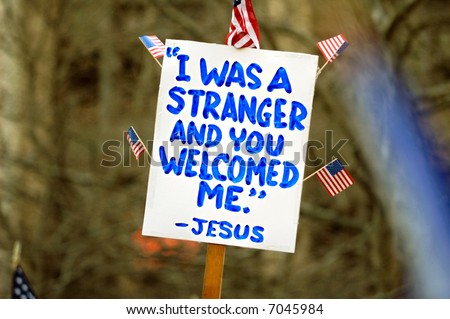The Church and the Bishop's Statement on Immigration

Our Bishop put out a statement this past week on legislation being considered by the Indiana legislature. Here is his statement in full.
Bishop's Statement Regarding Immigration Legislation
The legislature of the state of Indiana is considering the complicated issue of immigration. Certainly it is understandable that many citizens and many State Senators and Representatives are concerned about this important issue. However, our Christian faith brings a perspective to this issue which needs to be voiced, and our United Methodist Church has a particular stance on this issue which I share as the Bishop of the Indiana Area of The United Methodist Church.
Among the proposed bills before the Senate and House is one which seems to be gathering some support, namely Senate Bill No. 590. I have read through this proposed legislation, and while I am not an attorney and may not fully understand all of the legal implications of this bill, I do believe that it would be a mistake for the Senate and/or House to pass this Bill and for the Governor to sign it, for these reasons;
First, this bill begins to move the state of Indiana into areas which rightly belong to the federal government, namely the attempt to regulate immigration. Certainly there is frustration over the failure of our federal government to fulfill its duty in this area, but having each of our 50 states adopt their own immigration policies would be chaos and a violation of our U.S. Constitution.
Second, this bill would place our police officers and our business owners in an impossible situation of trying to determine when and if they should demand proof of citizenship or legal residency. It is clear from the experience in other states which have attempted similar provisions that the police are almost forced into racial profiling to meet the requirements of such a provision. Likewise business owners are faced with new liabilities and costs as they seek to monitor their customers according to the requirements of such legislation.
Third, this bill would only add to the climate of fear and suspicion which permeates too much of our culture already.
I believe that Senate Bill No. 590 is contrary to the Social Principles of our United Methodist Church, and therefore I urge all of our United Methodist people to express to their State Senators and Representatives their opposition to this bill. We must find a better way to enforce the laws which already exist against illegal immigration, and we must also find a better way to protect our legal citizens and residents from coming under undue suspicion and harassment.
Bishop Michael J. Coyner, Indiana Area
February 18, 2011
While I am in opposition to this bill myself, I must admit that this statement is troubling to me. My concern is that the Bishop makes only a political argument and not a Biblical/Theological argument. It would seem like we have a rich vein of tradition to fall back on here. Our theological heritage, our roots, certainly start with being immigrants/slaves in Egypt. Our roots have us setting out for freedom from an oppressive situation, looking for a land flowing with milk and honey. The history of the Hebrew scriptures is filled with stories of the people of God finding themselves as strangers in a strange land. And also we find many, many words and stories in the Hebrew scriptures of God's frustration (condemnation?) of the people of Israel for their lack of hospitality to the stranger (the immigrant). The Gospel story plays this story out again and again and again. Even Jesus' confrontation with the Canaanite woman reveals a lesson taught about how one treats the stranger. Paul is often challenging the people of the congregations to whom he writes about the way in which they welcome strangers. Surely, surely, surely, with so rich a vein from the book that we all hold as central to our traditions they are worth a mention (since even the Social Principles get some love in this statement).
I hope I'm not nit-picking here. I don't want to be. I also miss the challenge to our congregations for anything besides calling our elected officials. What about celebrating and challenging the ways in which we welcome the stranger?
I was contemplating reading the Bishop's statement to the congregation yesterday at worship. But I didn't. It just felt too paltry, too shallow...it wouldn't have added to our worship of God. It made me sad.


1 Comments:
I felt the same way when I read it. I've been shocked about how much conversation in the church happens as the Bible and our theological heritage did not exist.
It has been a great puzzle to me.
Post a Comment
<< Home